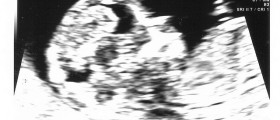
You will be comforted to know that the majority of pregnancies go without a hitch and if detecting early symptoms of possible problems then the risk to mother and baby are reduced significantly.
During the first trimester of a pregnancy bleeding or spotting is a frequent complaint by twenty to twenty five percent of mothers to be, it is almost impossible to say which cases are problematic and which are not even though only 2.5% of these actually lead to miscarriage also known as a spontaneous abortion, so it is always best to see your doctor straight away. Most of the time you will find the spotting will happen when you would normally expect your period. However there are other reasons for bleeding such as infections and can be examined with doing a CBC and a thorough physical exam Your doctor may want to check your HCG levels and serum progesterone levels.
Your doctor can do an ultrasonography which will tell your doctor if the pregnancy is growing at a good rate or not whether it is a strangely located pregnancy also known as ectopic and if the heart beat can be seen at eight weeks.Severe Vomiting can be caused because the B-hCG hormone which has a motivating result on the center of vomiting in brain. It is normal to feel sick and maybe vomit now and again but any continual vomiting can be serious, however this only happens in one out of 800 women.
The actual risk of having a misscarriage with no history of this happening before is about 15%.The risk will increase with past history.There are four types of Spontaneous Abortion which are Habitual Abortion, Threatened Abortion, Inevitable incomplete Abortion and Missed Abortion. A Threatened Abortion will give you signs like bleeding and lower abdominal cramps. An Inevitable Abortion and Incomplete Abortion is basically when fragments have not been completely expelled. A Missed Abortion is when the feotus has died and has not been expelled after a period of four weeks. A Septic Abortion is associated with a fever, pain and a strong smell with discharge and this will need to be treated with antibiotics and the removal of the sepsis. A Habitual Abortion means when you have experienced over three consecutive spontaneous abortions this occurs in very rare cases of less than one percent of women. Doctors will do a full examination to get to the root cause.

















Your thoughts on this
Loading...